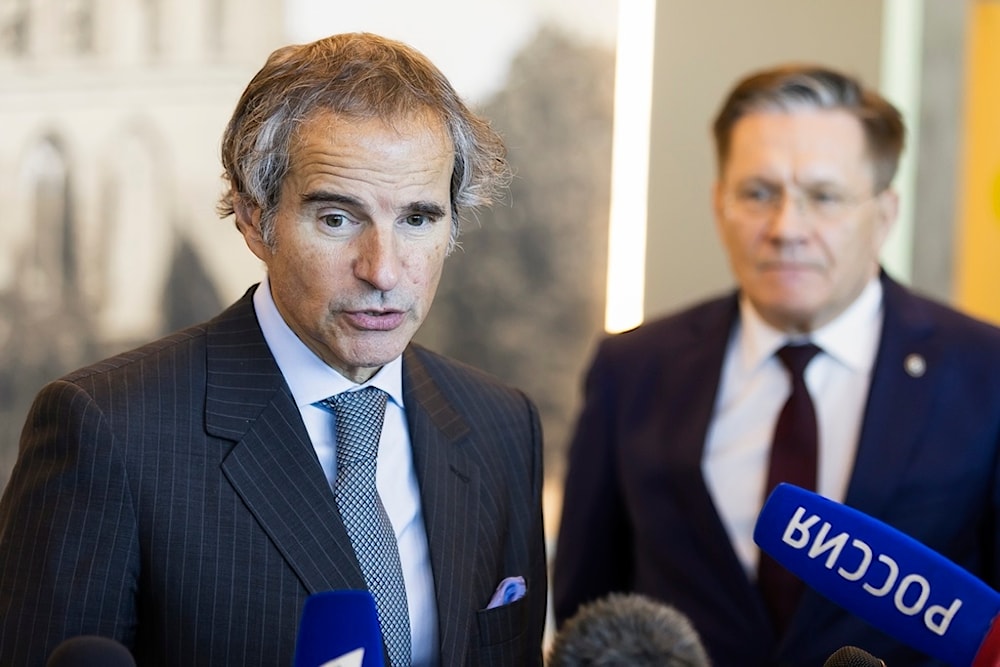No evidence of secret Iranian nuclear weapons development: IAEA chief
When asked about the possibility of Iran creating a nuclear bomb, Grossi said, "We have no information that the Iranians are pursuing a secret, parallel nuclear program."
-

International Atomic Energy Agency (IAEA) Director General Rafael Mariano Grossi, left, and Rosatom State Atomic Energy Corporation Director General Alexey Likhachev speak to the media after their talks in Kaliningrad, Russia, Tuesday, May 28, 2024. (AP)
In an interview with the Swiss newspaper Neue Zurcher Zeitung on Thursday, International Atomic Energy Agency (IAEA) Director General Rafael Grossi said that there is no evidence that Iran is secretly developing nuclear weapons.
When asked about the possibility of Iran creating a nuclear bomb, Grossi said, "We have no information that the Iranians are pursuing a secret, parallel nuclear program."
Such a program has however existed in the past, as per IAEA data, he claimed.
At the same time, certain aspects of Tehran's nuclear activities, such as stocks of highly enriched uranium and the capability to manufacture advanced uranium centrifuges, raise concerns about potential links to a nuclear weapons program, according to Grossi.
"That's why we need clarity before there is a complete collapse of the surveillance system," the IAEA chief said.
Iran's nuclear program has come back to debates following the US withdrawal from the JCPOA in 2018. In 2021, Tehran allowed the IAEA to replace cameras at the nuclear facility in Karaj but stipulated that it would share the camera footage data only after the US lifted its sanctions.
Read more: 'Israel' owns 90 nuclear warheads: ICAN
Earlier today, Russian President Vladimir Putin announced that Russia is contemplating revisions to its nuclear doctrine in response to recent developments in Western strategic thinking that could lower the threshold for using nuclear weapons.
Speaking at a press conference during his visit to Vietnam, Putin expressed concerns over emerging technologies, including ultra-low power nuclear devices, being discussed in Western expert circles.
"Now we are also thinking about what and how could be changed in the nuclear doctrine, in the strategy. And it is connected with this. It is connected with the fact that there are new — in any case, we know that the probable enemy is working on it — new elements related to lowering the threshold for the use of nuclear weapons," Putin said.
Putin dismissed the necessity of a preemptive nuclear strike clause in Russia's doctrine as he expressed confidence in Russia's capability to respond effectively to any aggression with a retaliatory strike.
Read more: Kanaani condemns Graham after he urged to nuke Gaza
In late April, a senior official in the Islamic Revolution Guard Corps (IRGC) said that Iran may reconsider its nuclear doctrine amid growing Israeli threats to the country's nuclear plants.
"The threat from Israel to Iran's nuclear facilities allows Iran to reconsider and deviate from its declared nuclear doctrine and policy," said Ahmad Haghtalab, according to Tasnim news agency.
Reiterating statements made by Iran's top military and political officials, including the Iranian leader Sayyed Ali Khamenei, Haghtalab added that Iran is ready to repel any Israeli aggression on its nuclear facilities and subsequently respond to the attack.
Expressing confidence that the Iranian nuclear facilities will be safe and secured, he maintained, "From the very beginning, Iran was ready to counter threats from Israel. Thanks to the use of passive defense plans, as well as the most modern weapons, thanks to the dispersal of nuclear facilities throughout Iran, we are ready to counter any threat from Israel to our nuclear facilities."

 3 Min Read
3 Min Read








